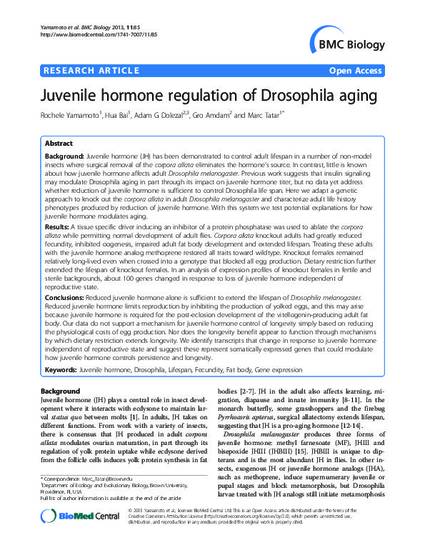
Background: Juvenile hormone (JH) has been demonstrated to control adult lifespan in a number of non-model insects where surgical removal of the corpora allata eliminates the hormone’s source. In contrast, little is known about how juvenile hormone affects adult Drosophila melanogaster. Previous work suggests that insulin signaling may modulate Drosophila aging in part through its impact on juvenile hormone titer, but no data yet address whether reduction of juvenile hormone is sufficient to control Drosophila life span. Here we adapt a genetic approach to knock out the corpora allata in adult Drosophila melanogaster and characterize adult life history phenotypes produced by reduction of juvenile hormone. With this system we test potential explanations for how juvenile hormone modulates aging.
Results: A tissue specific driver inducing an inhibitor of a protein phosphatase was used to ablate the corpora allata while permitting normal development of adult flies. Corpora allata knockout adults had greatly reduced fecundity, inhibited oogenesis, impaired adult fat body development and extended lifespan. Treating these adults with the juvenile hormone analog methoprene restored all traits toward wildtype. Knockout females remained relatively long-lived even when crossed into a genotype that blocked all egg production. Dietary restriction further extended the lifespan of knockout females. In an analysis of expression profiles of knockout females in fertile and sterile backgrounds, about 100 genes changed in response to loss of juvenile hormone independent of reproductive state.
Conclusions: Reduced juvenile hormone alone is sufficient to extend the lifespan of Drosophila melanogaster. Reduced juvenile hormone limits reproduction by inhibiting the production of yolked eggs, and this may arise because juvenile hormone is required for the post-eclosion development of the vitellogenin-producing adult fat body. Our data do not support a mechanism for juvenile hormone control of longevity simply based on reducing the physiological costs of egg production. Nor does the longevity benefit appear to function through mechanisms by which dietary restriction extends longevity. We identify transcripts that change in response to juvenile hormone independent of reproductive state and suggest these represent somatically expressed genes that could modulate how juvenile hormone controls persistence and longevity.
Available at: http://works.bepress.com/hua-bai/12/

This article is from BMC Biology 11 (2013): 85, doi: 10.1186/1741-7007-11-85. Posted with permission.